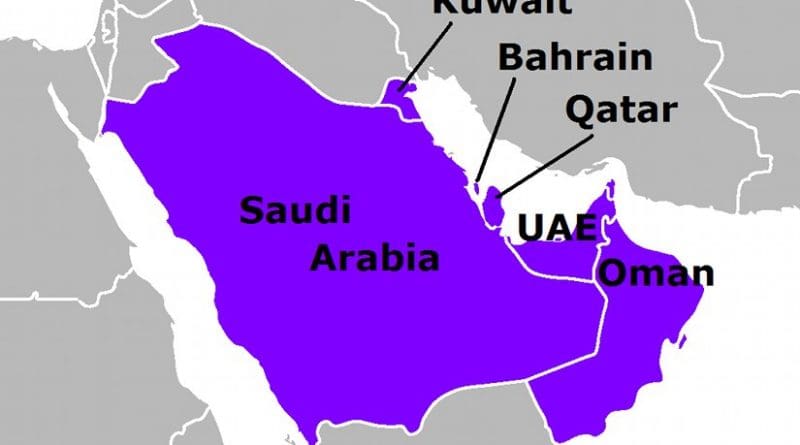IMF Predicts GCC Economic Doomsday By 2034 – OpEd
By Arab News
By Abdel Aziz Aluwaisheg*
Last week, the Washington-based International Monetary Fund (IMF) issued a rather pessimistic report questioning the ability of Gulf Cooperation Council (GCC) countries to manage their diversification from oil fast enough. In particular, “The Future of Oil and Fiscal Sustainability in the GCC Region” pointed to a growing gap between what it described as the slow rate of diversification compared to a faster-than-expected rate of switching to non-GCC sources of conventional and new fuel sources around the world.
It points out the fact that oil markets are undergoing unforeseen fundamental changes. On the one hand, new technologies are increasing oil supplies from old and new sources, while rising concerns over the environment are seeing the world gradually moving away from oil.
GCC countries hold about 40 percent of the world’s oil reserves and 20 percent of gas. GCC producers account for about a quarter of global oil exports and a significant share of natural gas trade. Oil and gas exports represent the engine of the GCC’s economic growth, as they are largely the main source of government revenue.
The GCC countries have long recognized the need to reduce their reliance on oil and gas. They are all implementing reforms to diversify their economic base and fiscal revenues.
However, the global picture is rapidly changing in many ways. First, new technological breakthroughs have reduced the cost of production and made shale oil a more serious rival to conventional oil. Second, international climate change advocacy has accelerated the switch to renewables at a rate faster than previously thought.
The IMF expects that, at the current diversification rates, GCC financial wealth could be depleted by 2034. As revenues from oil shrink, governments will be forced to rely on previous savings, which it estimates at about $2 trillion, or about $133 billion a year, on average, until then. The IMF is calling for diversification plans to move faster to meet those challenges. Otherwise, the IMF predicts that, by 2034, GCC countries will find themselves without significant savings, forced to borrow at high rates or drastically cut expenses.
The IMF also raised the moral dilemma of intergenerational justice: By drawing down all that accumulated wealth, new generations will be left with little wealth of their own, as the oil boom generations exhaust those savings.
The picture the IMF draws is quite gloomy. Some Gulf critics have said that it is also unrealistic and that, long before they run out of fiscal reserves in 2034, policymakers would switch gears and prevent such a calamity from taking place. The problem is that, according to the IMF, adjustments take time to provide the desired effects. Fiscal adjustments may be done quickly, but their economic, social and political repercussions are complicated. Taxes, for example, could slow down economic growth as they reduce disposable income and funds available for private investment. Diversifying the economic base is even harder. Retooling the workforce to meet the needs of the new diversified economies is probably the toughest challenge.
The 2034 doomsday is an average. Some GCC countries could face that challenge earlier; some are almost already there. Some have more time, but their economies will be affected if their neighbors run out of wealth and regional economic growth slows. They could also be called upon to help their less fortunate neighbors. As such, in all cases it is imperative to give greater priority to diversification in all GCC countries.
The next 14 years, until 2034, is a short time to diversify economies and government revenues, but it is not impossible. As the IMF itself recognizes in this report, GCC countries are moving in the right direction, but they need to go faster. International and local economists have long proposed measures that could speed up the achievement of diversification goals.
Managing a rapid diversification process will be a tough task, as the current generation has grown accustomed to an oil-based economic life: Low taxes, free education and health care, low energy prices, and easy, publicly funded employment. Individuals, government employees and businesses all need a new austere lifestyle if GCC countries are to meet the IMF’s challenge by 2034.
Rapid diversification will require sizable fiscal adjustments, including new non-oil revenues. However, those new revenues have to be calibrated so as not to contract the economy or reduce private investment and consumption. In addition, government spending needs to be rationalized by cutting waste and switching to productive expenditures, i.e., spending that could stimulate growth.
Not only is the present important, but the economic well-being of future generations should also be safeguarded. Their welfare would be helped by a strong early start with these reforms. The current generation needs to make the necessary sacrifices for the sake of their children and grandchildren. Rapid diversification, as required to meet the fast-approaching scarcity, could be expected to entail socioeconomic consequences affecting all aspects of life. As such, the process needs to be managed with the utmost care to preserve social cohesion while weaning GCC populations, economies and public coffers off their reliance on oil and gas revenues.
- Abdel Aziz Aluwaisheg is the Gulf Cooperation Council’s assistant secretary-general for political affairs and negotiation, and a columnist for Arab News. The views expressed in this piece are personal and do not necessarily represent those of the GCC. Twitter: @abuhamad1

